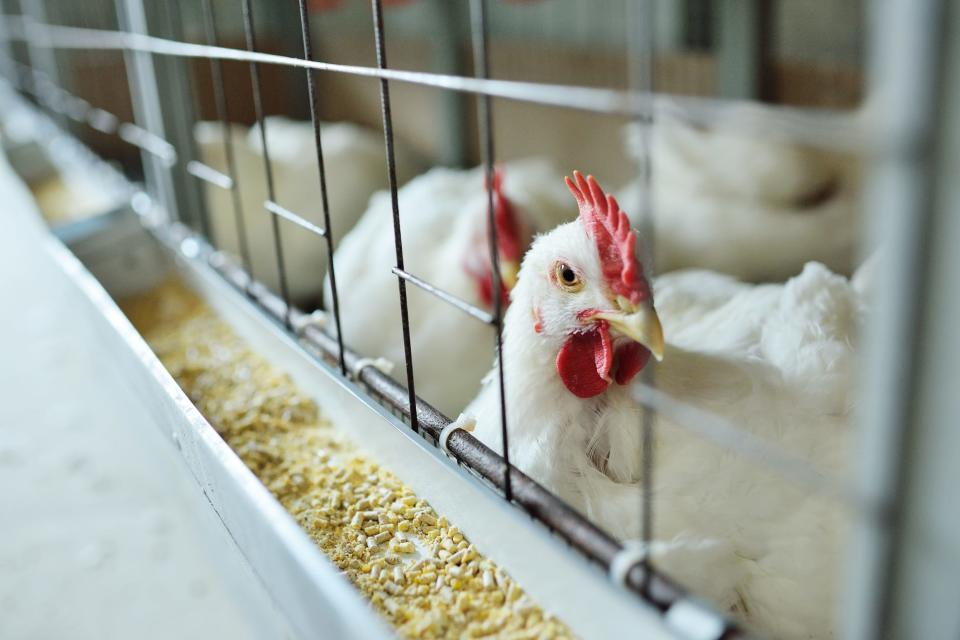Avian flu strain has Athens researchers seeking vaccines to protect Georgia poultry industry
It may be called the Peach State, but Georgia is the top poultry state in the nation. The state's poultry industry produces 1.3 billion broiler chickens each year.
Not only does it lead the nation in producing chickens, it also has some of the leading laboratories working to confront threats to poultry production, including an ongoing strain of an avian influenza outbreak that is outlasting most previous strains.
This spring, the Biden administration floated the possibility of vaccinating America's poultry against avian flu.

"The discussion of vaccination has been really brought to the forefront because of the duration of the outbreak of avian influenza that we are seeing in commercial poultry," said Karen Grogan, clinical associate professor with the Poultry Diagnostic and Research Center at the University of Georgia. "It's lasted over a year, whereas previous outbreaks will last ... four to six months."
One organization on the forefront of confronting this and other avian influenza outbreaks is the USDA’s Agricultural Research Service Southeast Poultry Research Laboratory in Athens.
Georgia has only seen two outbreaks of this current strain, both at small, non-commercial operations. But the current strain is ongoing, and seems to be persisting in wild birds as well, Grogan said, which can then be transferred to commercial birds.
But using vaccinations to address the outbreak can bring new logistical and political challenges.
By the numbers: As national emergency ends, here is how COVID-19 impacted Georgia
Tree fall: Police release more details of UGA student injured when tree fell on her
Developing a vaccine for avian influenza
The Southeast Poultry Research Lab has been working on highly pathogenic avian influenza since 1975.
"Our research includes developing improved diagnostic tests, new and improved vaccines, tracking mutation/evolution of recent avian influenza viruses, and sequence analysis of recent outbreak viruses," wrote David Suarez, acting laboratory director at the ARS Southeast Poultry Research Laboratory, in an email.
The scientists, technicians, students and post-doctoral researchers also work on evaluating how common new viruses are, how transmissible they are, and how long birds remain infectious.
And they work on developing new vaccines, if the U.S. decides to use them.
The work is not done in a silo. Despite the regional name, the work is national and international, Suarez said, and the lab collaborates with UGA and other universities, the Center for Disease Control and Prevention, and commercial companies.
"The biggest impact of our research was the development of the PCR test that is used for testing in the U.S. and other countries," Suarez wrote. "... Our control programs rely on early detection and rapid response, and our PCR test makes that possible."
Grogan said that there are several kinds of vaccines under development, and some are being tested to make sure they actually protect against the current strain. While many vaccines will protect against disease, Suarez wrote, they are hoping for a vaccines that prevents infection and limits how infectious a bird could be if it does become infected.
"We develop some vaccines and show them to be effective at laboratory scale, but we need to partner with commercial companies to get the vaccines licensed and commercially available," Suarez wrote.
Some countries are already vaccinating, said Grogan, but in the United States the research is still being tested and may not be implemented. It may not even be needed. Grogan said it does seem the outbreak is decreasing, but has continued to spread in South America.
"These viruses do continue to change and it could be the next time it changes, it shifts in a way that, you know, vaccination is no longer needed," she said. "But it's good to still have the tools available."

Commercial barriers to vaccination
One of the challenges of implementing a vaccine is whether vaccinated birds can be sold abroad.
"The biggest impediment to vaccination is the effect it will have on trade," Suarez wrote. "Currently, vaccinated birds or fresh poultry products from vaccinated birds are not accepted for trade by other countries."
One issue, Grogan said, is that current tests look for antibodies in response to viral exposure, which shows positive whether the exposure is through infection or vaccination. Another is that some countries assume if you are vaccinating against the influenza, you have an outbreak and do not want to accept these birds.
"The whole world is having an avian influenza outbreak right now. It's not just certain countries," Grogan said. "We're dealing with this on a global scale. So that makes the trade piece likely a shorter hurdle."
If vaccination is rolled out, it would likely go first to longer-lived, more valuable birds than the broiler chickens, such as egg laying chickens, turkeys, and breeding birds.
"Georgia would definitely be a user of avian influenza vaccines," Grogan said.
This article originally appeared on Augusta Chronicle: Georgia researchers work on vaccination against avian influenza

